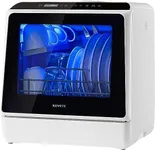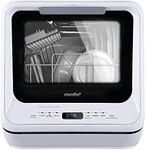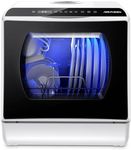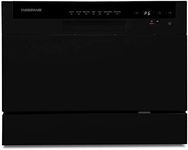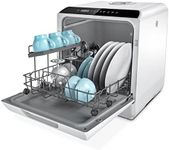Buying Guide for the Best Countertop Dishwashers
Choosing a countertop dishwasher can make your kitchen chores much easier, especially if you have limited space or don't want to install a full-sized unit. The key is to find a model that fits your kitchen, meets your cleaning needs, and is easy to use. Before you start shopping, think about how many dishes you typically wash, the space available on your counter, and any special features you might want, like quick wash cycles or extra drying options. Understanding the main specifications will help you make a choice that suits your lifestyle and kitchen setup.CapacityCapacity refers to how many place settings or dishes the dishwasher can handle in one cycle. This is important because it determines how often you'll need to run the machine. Countertop dishwashers usually range from 4 to 6 place settings. If you live alone or with one other person, a smaller capacity may be enough. For small families or those who cook often, a larger capacity will save you time and effort. Think about your daily dishwashing needs to decide which size is best for you.
DimensionsDimensions are the physical measurements of the dishwasher, including height, width, and depth. This is crucial because countertop space is often limited. Measure the area where you plan to place the dishwasher, including the space needed to open the door fully. Make sure to also consider the space required for connecting hoses. Choose a model that fits comfortably in your available space without crowding your kitchen.
Water Source ConnectionCountertop dishwashers typically connect to your kitchen faucet or have a built-in water tank. Faucet connection models require a compatible faucet and are ideal if you have easy access to your sink. Models with built-in tanks can be filled manually and are great if your faucet isn't compatible or you want more flexibility in placement. Consider your kitchen setup and how convenient each option would be for your daily routine.
Wash CyclesWash cycles are the different cleaning programs the dishwasher offers, such as normal, quick, heavy, or eco. More cycles give you flexibility to handle different types of loads, from lightly soiled glasses to heavily soiled pots. If you often wash a variety of dishes, look for a model with multiple cycle options. If your needs are simple, a basic set of cycles may be sufficient.
Drying FunctionSome countertop dishwashers include a drying function, which uses heat or air to dry your dishes after washing. This feature is important if you want your dishes ready to use right away, but it can add to the overall cycle time and energy use. If you don't mind air-drying your dishes or have space to let them dry naturally, you may not need this feature. Decide based on your preference for convenience and speed.
Noise LevelNoise level is measured in decibels (dB) and indicates how loud the dishwasher is during operation. Lower numbers mean quieter machines. If your kitchen is close to your living or sleeping areas, or if you prefer a quieter environment, look for a model with a lower noise rating. If noise isn't a concern, this spec may be less important for you.
Energy and Water ConsumptionEnergy and water consumption tell you how much electricity and water the dishwasher uses per cycle. Efficient models help you save on utility bills and are better for the environment. If you want to minimize your impact or live in an area with high utility costs, look for models with lower consumption ratings. If efficiency is less of a concern, you can focus more on other features.



